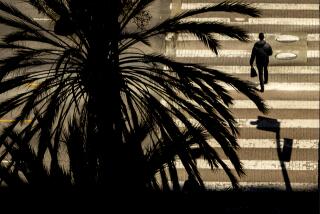Driving While Drowsy? It Is Illegal in New Jersey
NEW YORK — The out-of-control van crossed three lanes of traffic and smashed head-on into a car driven by Maggie McDonnell, killing the 20-year-old college student. The other driver -- who told police in New Jersey that he hadn’t slept for 30 hours before the accident -- received a $200 fine and a suspended jail sentence.
In response, Gov. James E. McGreevey recently signed Maggie’s Law, making New Jersey the nation’s first state to prohibit driving while drowsy.
The law defines a motorist who goes without sleep for more than 24 consecutive hours as a reckless driver who, in the event of an accident, can be charged with vehicular homicide and face up to 10 years in prison and a $100,000 fine.
“Maggie was just beginning her life as an adult when it ... came to a screeching halt,” McGreevey said at a ceremony attended by Carol McDonnell, who fought for the bill after her daughter’s 1997 death.
“In the memory of Maggie McDonnell, we are closing the legal loophole that allowed sleep-deprived drivers to take a life and get away with it.”
No driver has yet been charged under the law, which took effect in August, but safety advocates say its message is clear.
“Maggie’s Law is a very important step forward,” said Darrel Drobnich, senior director of government affairs at the National Sleep Foundation, a nonprofit research organization.
“It is the first law that specifically deals with the issue of drowsy driving and makes it a prosecutable offense.
“We hope it will spur educational initiatives.”
Polls show that more than half the nation’s motorists admit they have driven while drowsy, and 2 in 10 say they have fallen asleep at the wheel.
The National Highway Traffic Safety Administration estimates that at least 100,000 crashes and 1,535 fatalities a year are caused by fatigued drivers.
Federal researchers, while stressing that the data are taken from police reports, say they suspect the numbers may actually be higher.
“People aren’t willing to admit they fell asleep at the wheel, and will say they swerved to avoid a deer, a dog or a patch of ice if [they] go off the road,” said Robert Gaydosh, a spokesman for the New Jersey Division of Highway Traffic Safety.
Scientists say much of America is in need a good night’s sleep.
“At a minimum, sleep deprivation is huge,” said Joyce Walsleben, director of the sleep disorder center at the New York University Medical Center.
“At the minimum, 30% of the public or more is chronically sleep-deprived. Just about any survey will show that.... We are burning the candle at both ends. We don’t realize we are really paying a toll.”
Studies show that sleep deprivation can impair a person’s vision and coordination.
“People may focus on the wrong thing for too long,” Walsleben said.
“Every single weekend, there is at least one dead driver who was driving alone and ran off the road at 2 o’clock in the morning. We tend to think of sleep in those instances.”
The driver whose van struck McDonnell was tried twice in New Jersey.
The first jury deadlocked. During the second trial, defense lawyers argued that no state law existed forbidding falling asleep at the wheel, and that the motorist had done nothing wrong.
The judge had refused to allow jurors to consider the issue of sleep deprivation.
Drobnich said many states have prosecuted fatigued motorists who cause crashes by charging them with such violations as reckless driving, leaving the scene of an accident, failure to maintain control of a vehicle or manslaughter.
“We are looking for local juries to take sleep deprivation into account like [they do] drugs and alcohol,” he said.
More to Read
Sign up for Essential California
The most important California stories and recommendations in your inbox every morning.
You may occasionally receive promotional content from the Los Angeles Times.










